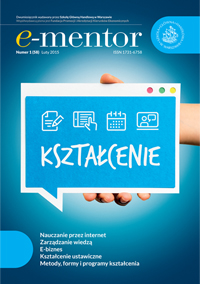Badania stanu i potrzeb informatyzacji edukacji matematycznej uczniów niewidomych i słabowidzących w Polsce
The study on the conditions and needs for computerization of mathematics education of visually impaired students in Poland
Author(s): Małgorzata Rubin, Marek Faderewski, Dariusz MikułowskiSubject(s): Essay|Book Review |Scientific Life
Published by: Szkoła Główna Handlowa w Warszawie, Fundacja Promocji i Akredytacji Kierunków Ekonomicznych
Keywords: mathematics education; visually impaired students; new technologies; informatics culture; assistive technologies; PlatMat
Summary/Abstract: Effective mathematics education of the visually impaired people and full accomplishment of the core curricular of this course is challenging, especially due to the current obligation of passing mathematics on a school-leaving examination. The transfer of knowledge in this field is primarily based on visual and spatial communication, which is a major barrier in the process of teaching/learning of the blind and visually impaired pupils. Research presented in this article was conducted in order to collect the specifics of teaching mathematics in Polish schools attended by visually disabled students as well as the opinions of teachers, students and their parents regarding their needs in this respect. The results confirmed the lack of friendly technologies tailored to identified needs, supporting the teaching process, including effective communication between the teacher (parent) and a student in the class (at home). Respondents' answers showed a high level of informatic culture - all use the computer, and 71% of teachers and 64% of students use it on daily basis. 90% of teachers were interested in learning about new technologies that are useful in teaching mathematics, and 79% of the students would like to use a computer, tablet or any other device to learn mathematics if properly adapted. This is a friendly environment for the development of the new assistive technologies in the field of mathematics education. One of them is an innovative educational platform PlatMat whose functional adaptation to the needs of users was obtained, among others, based on the results of this research.
Journal: e-mentor
- Issue Year: 58/2015
- Issue No: 1
- Page Range: 34-40
- Page Count: 7

